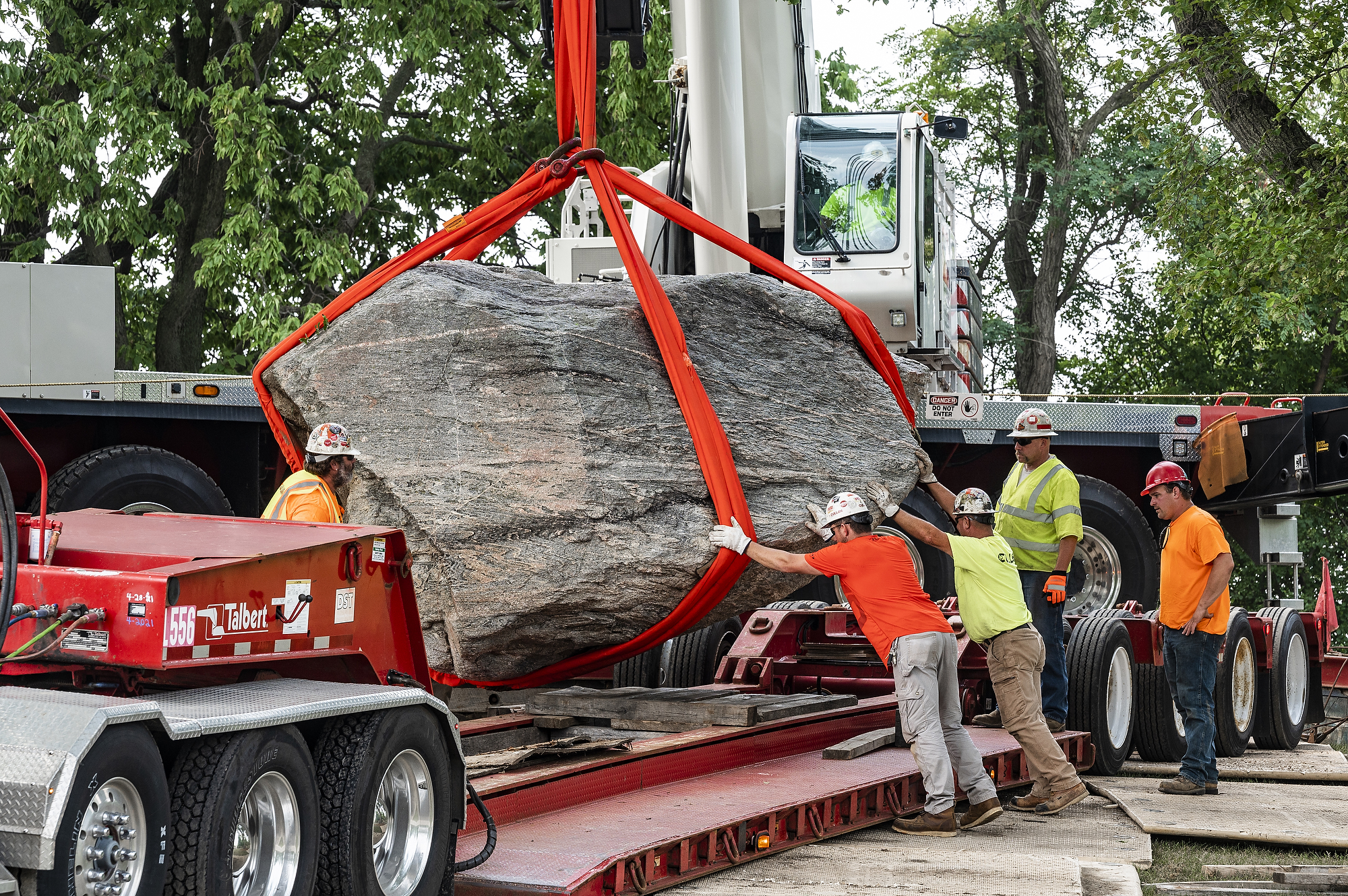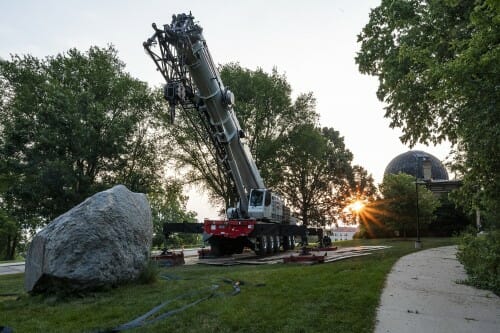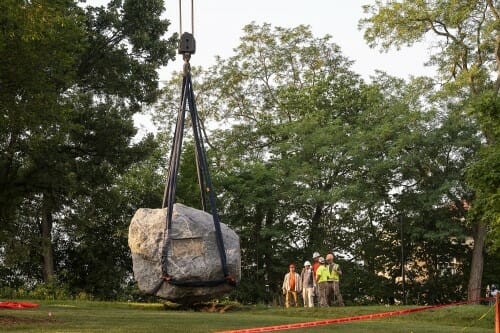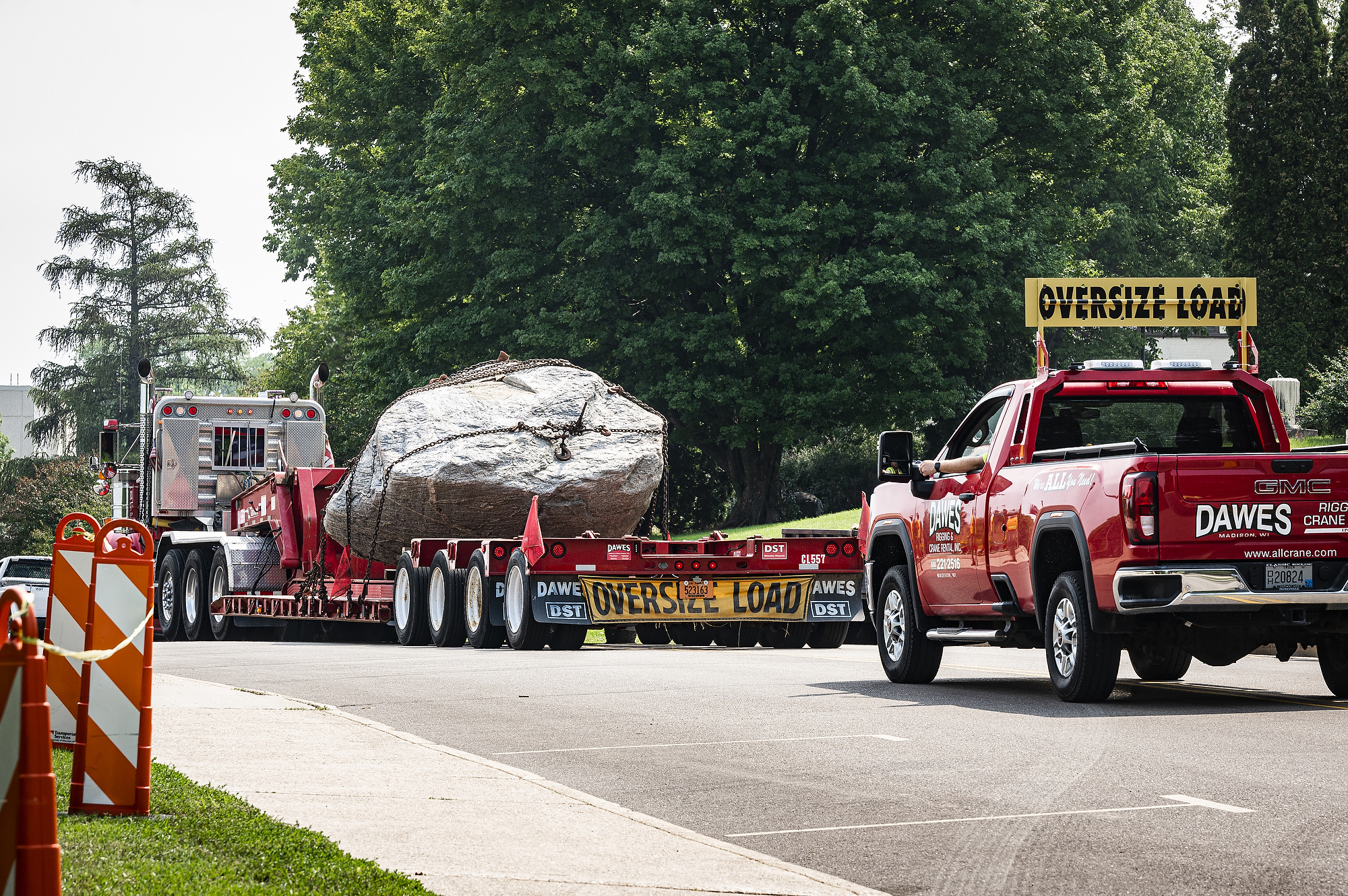No longer a memorial, rock removed from campus

The removal was a painstaking process that lasted just over four hours. Here, workers from JP Cullen and Dawes Rigging & Crane Rental maneuver the rock into position above the flatbed truck that would haul it to university-owned land southeast of Madison near Lake Kegonsa. Photo: Bryce Richter
The University of Wisconsin–Madison moved the former Chamberlin Rock, an object that had become a painful symbol of racism to generations of students, to a site off the main campus on August 6.
The rock had sat at the crest of Observatory Hill since 1925. That same year, it was referred to in a newspaper headline by a deeply offensive nickname that included a racial slur. The derogatory nickname was commonly used at the time to refer to any large, dark rock.
The Wisconsin Black Student Union, in partnership with the Native American student organization Wunk Sheek, led an effort to remove the rock from campus. UW–Madison’s main campus is on ancestral Ho-Chunk land.
View time-lapse video of the removal
Last November, students testified at a meeting of the Campus Planning Committee that the continued presence of the rock was a daily reminder of the injustices, past and present, that students of color face on campus. Committee members recommended to Chancellor Rebecca Blank that the rock be moved off campus; Blank accepted that recommendation.
“It took courage and commitment for the Wisconsin Black Student Union to bring this issue forward and to influence change alongside UW’s Wunk Sheek student leaders,” said Vice Chancellor for Student Affairs Lori Reesor. “In the midst of demands for justice following George Floyd’s murder last summer, the students wanted change on campus and they worked hard to see this through. While the decision required compromise, I’m proud of the student leaders and the collaboration it took to get here.”

As the sun rises over Lake Mendota and the Washburn Observatory, a crane sits ready to lift the rock. Photo: Bryce Richter
UW–Madison senior Nalah McWhorter, who served as president of the Wisconsin Black Student Union during the 2020-21 academic year, was among a small group of onlookers who watched as a crane lifted the rock out of the ground early Friday morning.
“It was very meaningful for me to be there and to see the process all the way through to the end,” McWhorter said. “It was about a year ago that we released our demands and met with the chancellor and explained to her why those demands meant so much to us. It was a powerful moment today to see this demand come full circle.”
McWhorter said she hopes that the removal of the rock inspires other students to work for change on campus.
“I see this as offering the next generation of students something to build off of,” she said. “We got this project going, and now the next round of students can continue to work on the other demands and come up with other ideas. We hope this movement and this momentum carries on.”
The rock is a rare, large example of a pre-Cambrian era glacial erratic, likely over two billion years old. It had been designated as a monument on campus in honor of Thomas Chamberlin, a noted geologist who also served as president of the University of Wisconsin from 1887 to 1892.
The plaque honoring Chamberlin has been removed from the rock. The rock will no longer be referred to by this name but rather known simply as a glacial erratic. A new plaque honoring Chamberlin will be placed on Chamberlin Hall.
The rock has been moved to university-owned land southeast of Madison near Lake Kegonsa. The area is within a glacial till landscape.
“Moving the rock to this remote site prevents further harm to our community while preserving the rock’s educational and research value for current and future scholars,” said Gary Brown, director of campus planning and landscape architecture, who led the search for the rock’s new location. “Students and the general public will no longer casually encounter the rock, but it will remain available to those specifically seeking it out for teaching and learning purposes.”
The rock has immense teaching and educational value in addition to its scientific importance, according to the UW–Madison Department of Geoscience. The department uses the rock in its coursework.

The rock is lifted from the ground. Archaeologists then observed the area underneath the rock but did not see anything significant. Photo: Bryce Richter
UW–Madison was statutorily required under Wisconsin’s Burial Sites Preservation Law to get permission from the Wisconsin Historical Society to move the rock because it sat within what is called a catalogued burial site. The rock was near effigy mounds that are sacred Native American burial sites. The Wisconsin Historical Society approved the UW’s permit on August 2 following two rounds of public review that sought input from various stakeholders, including the Native Nations of Wisconsin.
“We have worked closely with the Wisconsin Historical Society and our colleagues in the Ho-Chunk Nation to assure minimal, if any, disturbance to the sacred burial sites nearby,” Brown said. “Although the rock did not sit on top of a burial site, it was located within a protected Native American burial mound area.”
Bill Quackenbush, tribal historic preservation officer for the Ho-Chunk Nation, and Zachary Stencil, a project manager with the Archeological Research Laboratory Center at UW–Milwaukee, observed the moving of the rock. The presence of an archeologist was a condition of the state permit. The contractor laid ground mats to minimize any soil disturbance or compaction during the work. Over the decades, various estimates had placed the rock’s weight between 35 and 70 tons. The crane operator Friday was able to get an exact reading: 42 tons.
UW–Madison historians have not found evidence that the racist term attached to the rock in the 1925 newspaper article was used in any capacity by the university. However, they note that the Ku Klux Klan was a pervasive presence in the Madison area in the early part of the last century and that people of color were often mocked in minstrel shows at campus facilities and in campus satiric periodicals.
The cost to remove the rock is not expected to exceed $50,000 and will be paid for by the chancellor’s office using private donations.

Secured aboard a flatbed truck, the rock travels down Observatory Drive to its new site near Lake Kegonsa. Photo: Bryce Richter
